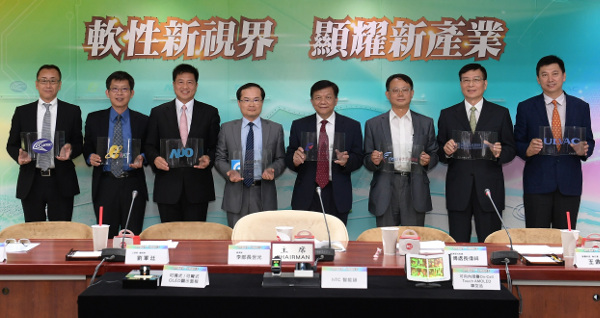Taiwan’s Ministry of Economic Affairs (MOEA) announced it will be supporting the development of OLED technology in Taiwan and will be investing NT $100 billion (about US $3.21 billion) to develop the technology, during a press conference to promote new display technologies in the country’s capital Taipei, stated the ministry.
The government is aiming to mostly invest in flexible AMOLED and PMOLED display technology, as part of its strategy in next generation displays. The injection of NT $100 billion to develop the next generation display technology is expected to generate 1,500 new jobs in Taiwan.
 |
|
Guests from Taiwan's OLED manufacturing industry, and ITRI and MOEA representatives appeared at the press conference hosted by MOEA, announcing the Taiwanese government's decision to invest in OLED technology. (LEDinside) |
The Department of Industrial Technology (DOIT), an organization under MOEA, noted the government will mostly be working through Taiwan’s Industrial Technology Research Institute (ITRI) to vertically integrate the OLED upstream to downstream sector in Taiwan to build a flexible display supply chain. The ministry is aiming to domestically manufacture core OLED materials and equipment, and has successfully developed a prototype AMOLED product from the initial collaboration. In the future, OLED display technology developed jointly between DOIT and ITRI will be transferred to local display manufacturers.
The ministry aims to collaborate with Taiwanese manufacturers to develop OLED material, equipment, panel modules, and systems to form a comprehensive vertical supply chain. MOEA envisions transforming Taiwan into the new global hub for flexible AMOLED display technology.
The Taiwanese government has been supporting Taiwanese OLED manufacturers over the past eight years through DOIT.
MOEA’s local R&D institute partner ITRI is collaborating with many Taiwanese LED manufacturers to develop new AMOLED products.
ITRI showcased its “7.07-inch Inward Foldable Touch AMOLED” display, which was developed with support from DOIT, said CT Liu, the institute’s Exectuive Vice President. The display replaces glass substrates with a flexible material, and is less than 0.15 mm thick. The thin display can improve mobile devices battery endurance and paves the way to developing rollable displays in the future.
With support from DOIT, ITRI is also in the process of creating a flexible AMOLED certification platform to assist manufacturers to develop flexible OLED product applications, which it showcased at the show. For example HTC’s curved AMOLED displays was applied in smart watches that were integrated into biosensors.
Ritek Group also showcased its curved PMOLED display, which could be employed in smart bands and other wearable devices, and flexible OLED luminaires.
These new wearable applications demonstrate the future potential of OLED devices.





 CN
TW
EN
CN
TW
EN






